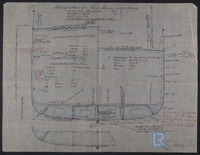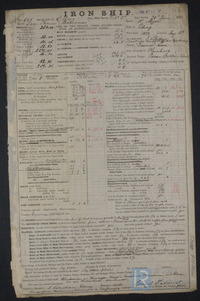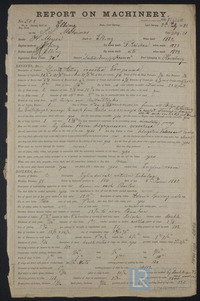- Related documents Related
- Complete documents list Documents
- Report ship? Report?
Use the data export button to extract customised data sets from the Ship Plan and Survey Report Collection. Available in TSV and CSV formats.
Name of ship as recorded on the record
The process of transferring a vessel to water, but not necessarily her completion.
The port or place in which the vessel’s construction took place, at the time of writing.
Predominant material(s) utilised in a vessel’s construction.
Material of construction
Iron ( Plan of Midship Section for Malvinas, 1881 1881, Iron Ship Report for Malvinas, 20th June 1882 1882 )
Confirmation as to whether the vessel was equipped with refrigeration machinery to aid in the transport of frozen or chilled cargo/goods.
Refrigeration machinery fitted for cargo purposes?
No ( Plan of Midship Section for Malvinas, 1881 1881, Iron Ship Report for Malvinas, 20th June 1882 1882, Report on Machinery for Malvinas, 3rd July 1882 1882 )
Does the vessel possess an auxiliary power source?
Is electric lighting fitted to the vessel?
Abbreviations of the names of ports with Lloyd’s Register survey offices.
Port of survey abbreviations
Ham ( Iron Ship Report for Malvinas, 20th June 1882 1882, Report on Machinery for Malvinas, 3rd July 1882 1882 )
The individual and/or organisation listed
Ship owner
Deutsche Dampfschiffahrtsgesellschaft Kosmos ( Iron Ship Report for Malvinas, 20th June 1882 1882 )
Deut Dampfschiff Ges Kosmos ( Report on Machinery for Malvinas, 3rd July 1882 1882 )
Name of surveyor.
Surveyor
Emil Padderatz ( Iron Ship Report for Malvinas, 20th June 1882 1882 )
Classification symbol assigned to a vessel by Lloyd’s Register’s Classing Committee denoting the quality of construction and maintenance.
Classification
+100A1; LA & CP; +Lloyds MC ( Iron Ship Report for Malvinas, 20th June 1882 1882 )
+LMC ( Report on Machinery for Malvinas, 3rd July 1882 1882 )
The name of the port/place of destination given.
Destined voyage
Ocean; Falkland Islands ( Iron Ship Report for Malvinas, 20th June 1882 1882 )
Type and configuration of the engine(s) supplied for a vessel.
Engine type
Direct Acting Inverted Compound ( Report on Machinery for Malvinas, 3rd July 1882 1882 )
Date in which construction of a vessel’s engines were completed.
Year of engine build
1882 ( Report on Machinery for Malvinas, 3rd July 1882 1882 )
The year in which a vessel’s construction is completed.
The individual and/or organisation listed as having been responsible for constructing the vessel. This can/may be the same as the owner and/or manager.
A vessel’s means of propulsion.
Is the steamer assisted by sail?
Is machinery fitted at the aft of the vessel?
Generally a smaller additional auxiliary boiler (often used while the vessel is at port).
Name of the Proving House responsible for the public testing and certification of a vessel’s anchors and/or chain cables.
The listed port to which a given vessel belongs.
Port belonging to
Hamburg ( Iron Ship Report for Malvinas, 20th June 1882 1882, Report on Machinery for Malvinas, 3rd July 1882 1882 )
An officially licensed mariner (post 1850) holding ultimate command and responsibility for a vessel.
Location where a vessel’s survey was undertaken.
Location of Survey
Elbing; Hamburg ( Iron Ship Report for Malvinas, 20th June 1882 1882, Report on Machinery for Malvinas, 3rd July 1882 1882 )
Recorded information related to a vessel’s movements.
Voyage information
Elbing; Ocean; Falkland Islands ( Iron Ship Report for Malvinas, 20th June 1882 1882 )
A ship’s total internal volume in ‘register tons’ (replaced by gross tonnage post 1982).
Gross Register Tonnage
324 ( Iron Ship Report for Malvinas, 20th June 1882 1882 )
219 ( Report on Machinery for Malvinas, 3rd July 1882 1882 )
Location of construction for a vessel’s engines.
Location of engine build
Elbing ( Report on Machinery for Malvinas, 3rd July 1882 1882 )
Report an issue with this ship
Have you noticed missing or incorrect data or images for this ship?
Please let us know and we will rectify the issue as soon as possible.



